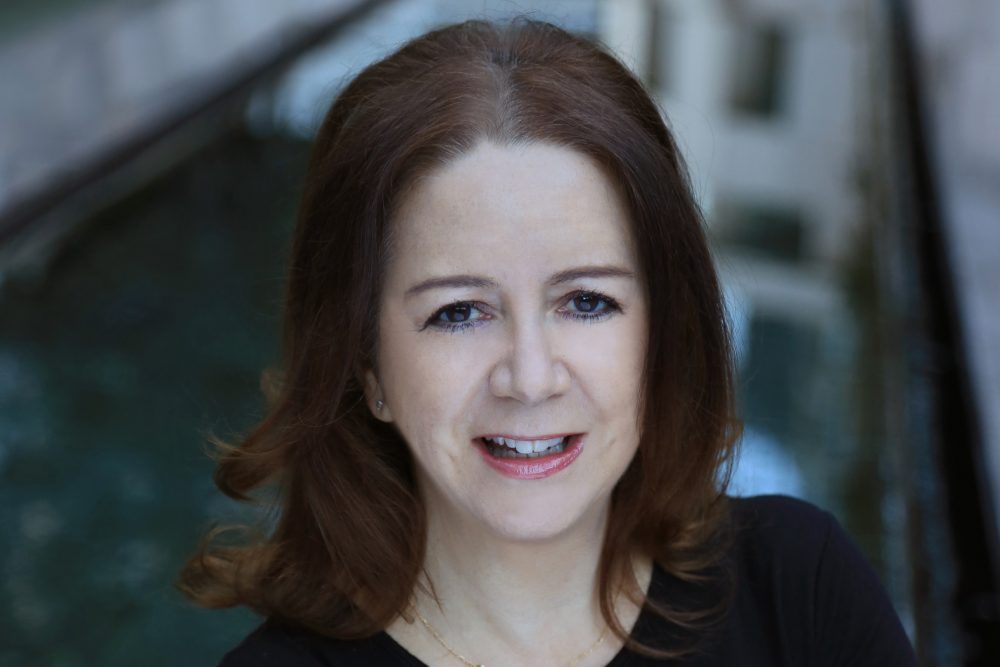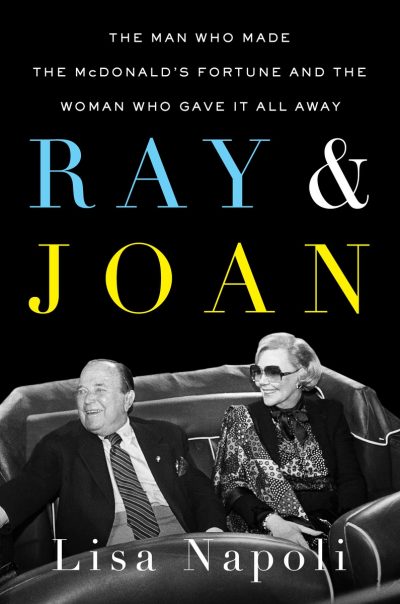Advertisement
New Book Explores Lives Of The First Couple Of McDonald's
Resume
Ray Kroc took McDonald's restaurants from a small franchising operation to a global brand. His wife Joan left over $1 billion to various charitable organizations.
Their story is now being told in a new book. Author Lisa Napoli (@lisanapoli) joins Here & Now's Jeremy Hobson to talk about "Ray & Joan: The Man Who Made the McDonald's Fortune and the Woman Who Gave it All Away."
Book Excerpt: 'Ray & Joan'

By Lisa Napoli
Even before she married Ray Kroc, Joan learned it was possible to outsource bad news. When she agreed to Ray’s proposal the second time—six years after first accepting and reneging—Ray had his lawyer break it to his then-wife that he wanted a divorce. Ray was notorious for having his trusted secretary fire employees for the slightest infraction, like wearing what he deemed an inappropriate hat or drinking the wrong cocktail. (Manhattans, he thought, were for sissies. Inevitably, the next day, in the hazy aftermath of the heated moment, he’d wonder why the person hadn’t shown up for work.
After he died in 1984, leaving her heir to a fortune greater than one person could reasonably spend in a hundred lifetimes, Joan followed Ray’s example. Having decided she no longer wanted her former son‑in‑law to serve as her proxy on the board of that “chauvinistic corporation” McDonald’s, she sent her Gulfstream jet to Chicago to pick up her chief advisor and bring him to her home in San Diego for a chat, then dispatched him back to company headquarters in suburban Chicago to relay her wishes—despite the fact that the ex‑son‑in‑law lived just up the street from her. Feeling betrayed by a once-beloved cook who deigned to ask for a modest raise after years of service, she turned to another member of her personal staff to dismiss him.
Now, in June 2003, faced with the harsh reality that she was dying, Joan requested her personal physician break the difficult news to her immediate family.
It was early summer in southern California, a gloomy gray blotting the morning skies. Leaves on the eight hundred trees in and around Joan’s meticulously manicured thirteen-acre estate, Montagna de la Paloma—built on land owned long ago by the earliest movie stars— feathered softly in a light breeze. The fragrant scent of blooming roses sweetened the dry desert air. She’d humored her head gardener, who’d pleaded for the go‑ahead to plant hundreds of the thorny bushes. He liked having a ready source of cut flowers. With the door to the family room closed and Joan nowhere in sight, the doctor held up a scan of the matriarch’s brain, riddled with cancer.
“This is the saddest day of my life,” he said solemnly, explaining the nuances of this particular menace, a glioblastoma that had been slowly impeding Joan’s vision, her speech, her balance. The diagnosis clicked into focus what the family had been observing for a while. Linda, Joan’s only child, and Linda’s four children, all women now, felt something had been off in the typically buoyant seventy-four-year-old’s step. In March, she had radiated joy at the gala opening of one of her pet projects, surprising the crowd as she took to the stage with the hired entertainment for the night, Tony Bennett. And yet, to those who knew her, there was something not quite right.
At this point, the doctor revealed, the cancer would begin to grow at warp speed, wending its way through her brain, impacting every bit of her function, with the terrible, inevitable outcome: Joan had three to nine months to live.
A moment of silence pierced the room as the sad information soaked in, after which a few of the girls began to sob. The others froze in shock.
Only after she was sure the message had been relayed did Joan hobble in, masking her fractured gait as best she could. She had always been a blur of motion and cigarette smoke, action and forward momentum. Joan vibrated with life so intensely, it was impossible for anyone in her orbit to imagine a day when she wouldn’t be present. So game, so intrepid, so opinionated and tough, Joan was a wildly unpredictable study in extremes. She’d hop into her jet—her prized possession—as casually as if it were a convertible, off to Vegas to gamble for sixteen hours straight, winning or losing a million bucks; or rouse her great-grandson for a trip to the convenience store for a hot dog in the middle of the night. Yet she was just as likely to feast on a simple salad for dinner and retire at seven p.m. after phoning to find help for some itinerant soul she’d discovered in the parking lot of her neighborhood McDonald’s. Publicly, she’d appear meticulously put together in stylish Givenchy or elegant St. John, perfumed with a spicy hint of Yves Saint Laurent’s Opium, her hair so neatly coiffed it wouldn’t move in a strong breeze. Many mornings after waking, she might whisk down the hill, hair wrapped in a turban to mask the impact of a night of sleep, so she could grab a Diet Coke (for her) and a Big Mac (for the lucky pooch who got to ride along). Occasionally, she’d forget her purse and the kind cashier, who had no idea who she was, would wave her through; other times, she’d proffer a hundred-dollar tip.
Even her collection of a half dozen dogs exemplified her lopsided nature. She had a thing for strays, among them a three-legged creature. She’d drive her staff bonkers by crossing the border to Tijuana, dognapping some mangy critter from a sad, destitute existence on the streets, whisking it back in the trunk of her Mercedes to a luxurious life of filet mignon. Others in her collection were prissy purebred Cavalier King Charles spaniels with pedigrees worthy of the royalty they were bred to serve. She’d fallen in love with a particularly cute one named Ralph she’d seen on a website, and sent her plane to transport both the doting breeder and the dog from Ohio. When the critters passed away, they were laid to rest with reverence in a pet cemetery on her grounds.
Halloween would never be the same without Joan dressed up in costume, gaily dispensing Snickers bars to the trick‑or‑treaters traipsing around her tony neighborhood, Fairbanks Ranch, one of the wealthiest in the nation, where armed guards at the entrance gate added a layer of protection to Joan’s already impenetrable life.
On the day her family learned the news, she was as resolute as ever. “I don’t want any tears,” she said, waving her hands, facing her heartbroken family. “I’ve had a great life. Let’s make the most of the last days I have.” She intended to fully live those few weeks and months, not die them.
The next morning, she kept her appointment to grab breakfast at McDonald’s with one of her granddaughters and her great-grandson, pausing for just a moment when they arrived home, with the boy safely out of the car, to allow the young woman to cry. There was much work to be done. With the help of the coexecutors of her estate, Dick Starmann, a former McDonald’s executive, and Nancy Trestick, a woman who’d risen through the ranks in her secretarial pool, Joan set about attacking the business of dying with the same chaotic zeal with which she’d lived, working through the details of her last wishes as if she were making the guest list for a party. Before she breathed her last, she’d throw a party for herself, too.
All tallied—this property; her Gulfstream IV jet, decorated in her chosen mauvy pinks and as lush as a Ritz-Carlton; jewels fit for the royalty of several kingdoms; $100 million in a wide-ranging art collection of serene impressionist florals, majestic Renoirs, comely nudes, and Rockwell Americana; and the seemingly endless pools of cash and investments—Joan had about $3 billion at her disposal. Three billion dollars—a fortune amassed because of a roadside hamburger stand started six decades ago by two hard‑up brothers she’d never met, a hundred long, dusty miles north of where she now sat. Joan, who arrived on this earth the year before the Great Depression gripped and paralyzed the nation; whose father struggled without work for seven years, and ran the numbers for the neighborhood; whose mother sold coffee beans door‑to‑door to help the family survive. There were challenges besides money. Joan had long been at odds with her mother, though time and age had mellowed the fierce battles of her youth. Scars from her early days had never healed; she carried a pain that never abated. She’d hint at it at odd moments, usually with people she didn’t know well, and then tuck the secret back away.
Adulthood hadn’t tamped the trials. When Joan’s own daughter, Linda, so sweet and blond and all of five years old, claimed the fifty-dollar first prize for her rendition of the cheerful song “Oh, You Beautiful Doll!” on the live local TV contest Toby Prin’s Talent Hunt, the winnings allowed the family to pay that month’s rent.
Another person might have been happy—even eager—to shelve the struggles of the past and fully inhabit the splendor of her current life. But Joan never felt entitled to simply revel in the fast-food fortune. The unfathomable sum she had at her disposal, at her complete discretion and control, enveloped her with awe. She was forever amused and amazed by it, as if it were a living, breathing organism she’d been entrusted to nurture and tend. If Ray hadn’t met and made the deal with those brothers . . . If she hadn’t been playing the organ that night he walked into the dining room . . . If her boss at the supper club hadn’t hired Joan’s first husband, Rollie, to manage the McDonald’s franchise he bought . . . If, then, if, then—where might life have taken her? Had she stayed with Rollie all these years, life wouldn’t necessarily have been bad. But it would hardly have been as big. She would never have befriended and supported some of the great thinkers of her time: a former president; a mystic priest; a children’s TV star; a crusading journalist who’d discovered, he believed, the secret to healing pain. She never would have experienced the joys and challenges of presiding over a major league baseball team! Of all the experiences a poor midwestern girl could only have imagined, her giving had been her greatest gift—to herself. The pleasure and thrill of helping faceless strangers. She wasn’t deluded enough to think she could fix the world’s problems, but she had loved making a tiny dent where she could.
Excerpted from the book RAY & JOAN by Lisa Napoli. Copyright © 2016 by Lisa Napoli. Reprinted with permission of Dutton, a member of Penguin Publishing Group (USA) LLC, a Penguin Random House Company.
This segment aired on November 15, 2016.